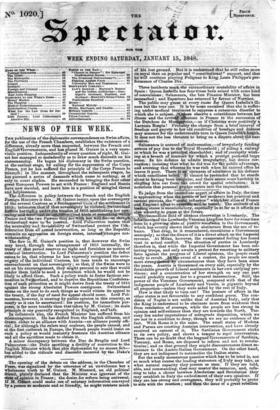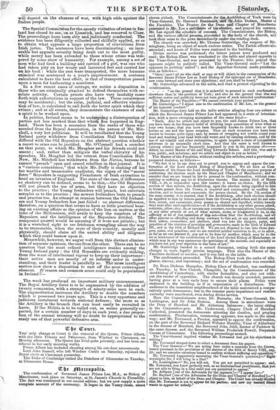To judge from the immediate aspect of affairs in Italy,
the time is approaching when the mettle of her moderate but practical and earnest patriots, the "moral influence" which her allies of France and Engiand affect to ems** will be tested. The attitude of all leading states is unsatisfactory, especially in so far as it affords no clue whereby to guese et the future. mmediate field of anxious observation is Lombardy. The
inT nts,of the Lombardo-Venetian kingdom have for some time been'in a growing state of passive resistadce to the Government, whiCh has overtly shown itself in abstinence from the use of to- bacco. That drug, be it remembered, constitutes a Goiernment monopoly; so that the disuse of it is a direct attack on the Imperial revenue. At Milan, however, the exasperated feeling has found vent in actual conflict. The situation of parties in Lombardy therefore is, that while the Imperial Government has been cola letting troops, and only awaits a pretext for resorting to military force against the progress of Liberal opinions, the people stand ready to revolt. In the event of a contest, the people are much more strengteeried by circumstances than they have been since the peace. Austria is threatened on every side, especially by the formidable growth of Liberal sentiments in her own outlying pro- vinces; and a concentration of her strength on any one part would probably expose her to a general insurrection. Still, the power of the Viennese Government, compared with that of the indigenous people of Lombardy and Venice, is gigantic beyond all proportion—unless they were aided by the rest of Italy.
How is that likely to turn out' The posture of affairs in the other states is not favourable to any confident guess. The con- dition of Naples is not unlike that of Austrian Italy, only that the King is understood to be obstinate more from weakness than from resolution of courage, while the people are less strong in opinion and self-reliance than they are towards the North. Tus- cany lies under imputations of retrograde disposition, which we are not in a condition to deny, though we see no evidence of the fact. With Rome it is the same. The small states of Modena and Parma are courting Austrian intervention, and have already received an earnest of it. The Sardinian Government sticks to its own policy, and shows a teektper to repel intervention. There can be no doubt that the leagued Governments of Sardinia, Tuscany, and Rome, are disposed to reform and not to revolu- tionize; and on that ground they might discountenance direct re- sistance to the Austro-Italian Government. On the other hand, they are not indisposed to nationalize the Italian states. But the really momentous'question which has to be tried is, not so much what course the leading statesmen of Italy may take, as what natural capacity they possess as men. If they are bold, able, and commanding, they may master the occasion, and, refu- sing to take a choice between Absolutism and Revolution they may establish in Italy the embodiment of their own opinions. If they are less strong and courageous, they will probably be prone to side with the reaction ; and then the issue of a great rebellion will depend on the chances of war, with high odds against the Italian people.



























